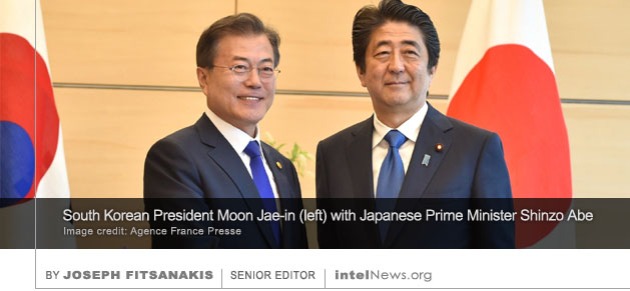Senior American, Japanese and S. Korean spy officials to meet behind closed doors
October 18, 2021 Leave a comment
 THE INTELLIGENCE CHIEFS OF the United States, Japan and South Korea are to meet behind closed doors this week. The meeting will take place nearly two years after a major diplomatic spat between Japan and South Korea threatened to significantly harm intelligence cooperation between them. In November of 2019, the South Korean government threatened to terminate the General Security of Military Information Agreement (GSOMIA). The agreement was initiated in 2016 under American tutelage, with the aim of facilitating the sharing of intelligence between South Korea and Japan about North Korea’s missile and nuclear programs.
THE INTELLIGENCE CHIEFS OF the United States, Japan and South Korea are to meet behind closed doors this week. The meeting will take place nearly two years after a major diplomatic spat between Japan and South Korea threatened to significantly harm intelligence cooperation between them. In November of 2019, the South Korean government threatened to terminate the General Security of Military Information Agreement (GSOMIA). The agreement was initiated in 2016 under American tutelage, with the aim of facilitating the sharing of intelligence between South Korea and Japan about North Korea’s missile and nuclear programs.
As intelNews explained at the time, the agreement fell victim to an escalating tit-for-tat row between the two Asian countries, which was rooted in the use of forced Korean labor by Japanese troops during World War II. The South Korean government demanded financial compensation for the use of slave labor, including sex slaves, by Japanese occupation troops during the annexation of Korea by Japan, which lasted from 1910 until 1945.
Tokyo responded to a mass boycott of Japanese goods in South Korea by limiting the export of electronics for use in South Korea’s ship-building industry. It also removed South Korea from the list of countries that can fast-track their exports to Japan. South Korea responded by threatening to not renew GSOMIA prior to it lapsing. With hours to go before GSOMIA’s expiration deadline, Seoul announced it would prolong the treaty. But the dispute continues to stymie intelligence cooperation between the two Asian nations.
On Saturday, the South Korean Yonhap News Agency cited “a government source” in reporting that the intelligence chiefs of the United States and Japan would travel to Seoul next week, in order to hold a series of meetings with their South Korean counterpart. Thus, United States Director of National Intelligence, Avril Haines, and Japan’s Director of Cabinet Intelligence, Hiroaki Takizawa, will meet with Park Jie-won, who heads South Korea’s National Intelligence Service.
The three officials will meet behind closed doors to discuss “strengthening their trilateral intelligence cooperation”, according to the report. There is renewed hope in Seoul and Tokyo that relations between the two nations can be mended, following the election of a new government in Japan earlier this month, under Prime Minister Fumio Kishida. The officials are also expected to discuss efforts to re-initiate negotiations with North Korea on a number of issues. Last month, South Korean President Moon Jae-in offered to begin negotiations with North Korea aimed at drafting a formal declaration to officially end the Korean War of 1950-1953.
► Author: Joseph Fitsanakis | Date: 18 October 2021 | Permalink
 South Korea appears determined to reject calls from the United States to maintain an intelligence-sharing agreement with Japan, as relations between Seoul, Tokyo and Washington continue to experience tensions. The South Korean government has been issuing warnings since August that it will
South Korea appears determined to reject calls from the United States to maintain an intelligence-sharing agreement with Japan, as relations between Seoul, Tokyo and Washington continue to experience tensions. The South Korean government has been issuing warnings since August that it will  South Korea has formally terminated an intelligence-sharing agreement with Japan, as relations between the two countries have reached their lowest point since they formally recognized each other in 1965. Seoul’s decision is the latest move in a tit-for-tad row sparked by the use of forced Korean labor by Japan in World War II. South Korea is demanding financial compensation for the use of slave labor, including sex slaves, by Japanese occupation troops during Korea’s annexation by Japan from 1910 until 1945. Last month, Tokyo responded to a mass boycott of Japanese goods by South Korean consumers by limiting the export of electronics to be used in South Korea’s ship-building industry. A few days ago, Tokyo also removed South Korea from the list of countries with the ability to fast-track their exports to Japan.
South Korea has formally terminated an intelligence-sharing agreement with Japan, as relations between the two countries have reached their lowest point since they formally recognized each other in 1965. Seoul’s decision is the latest move in a tit-for-tad row sparked by the use of forced Korean labor by Japan in World War II. South Korea is demanding financial compensation for the use of slave labor, including sex slaves, by Japanese occupation troops during Korea’s annexation by Japan from 1910 until 1945. Last month, Tokyo responded to a mass boycott of Japanese goods by South Korean consumers by limiting the export of electronics to be used in South Korea’s ship-building industry. A few days ago, Tokyo also removed South Korea from the list of countries with the ability to fast-track their exports to Japan.





